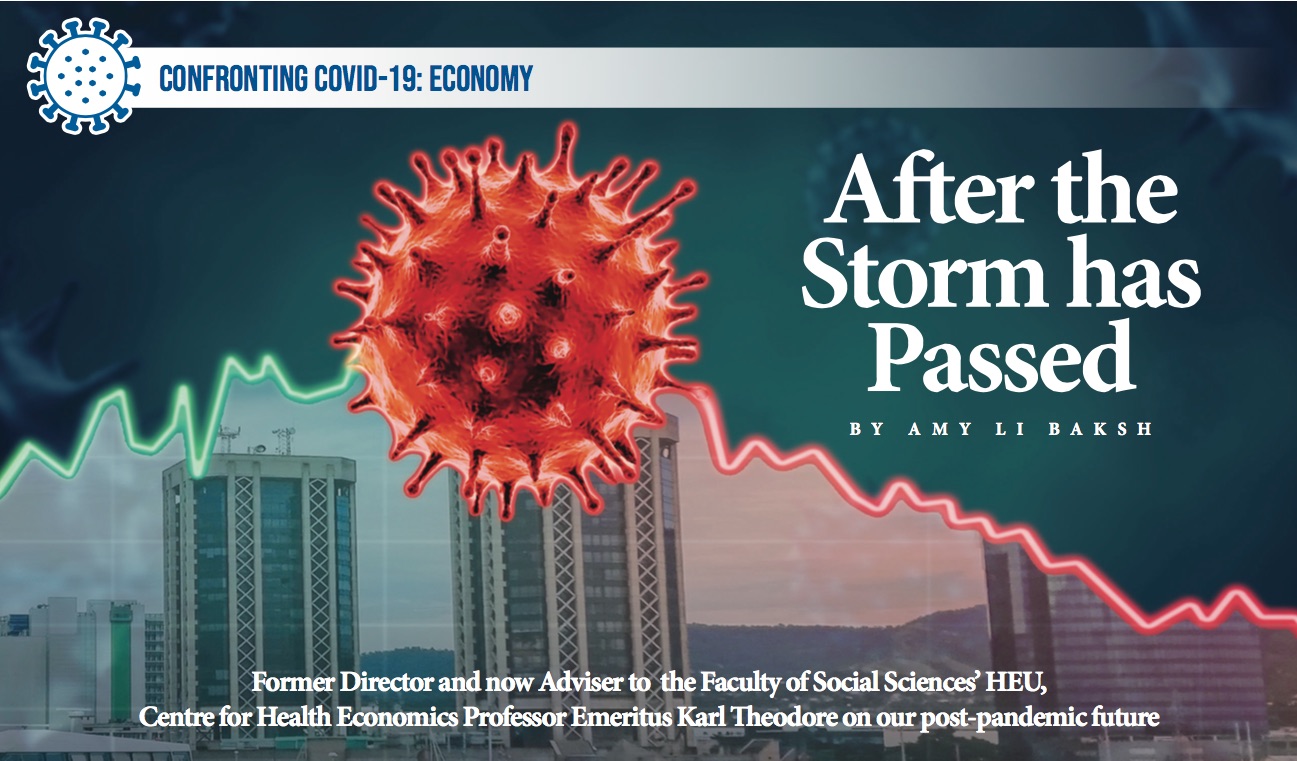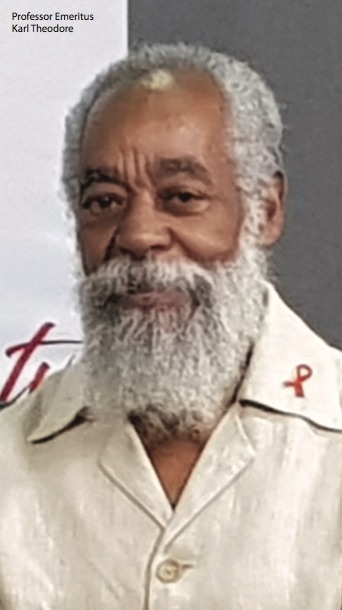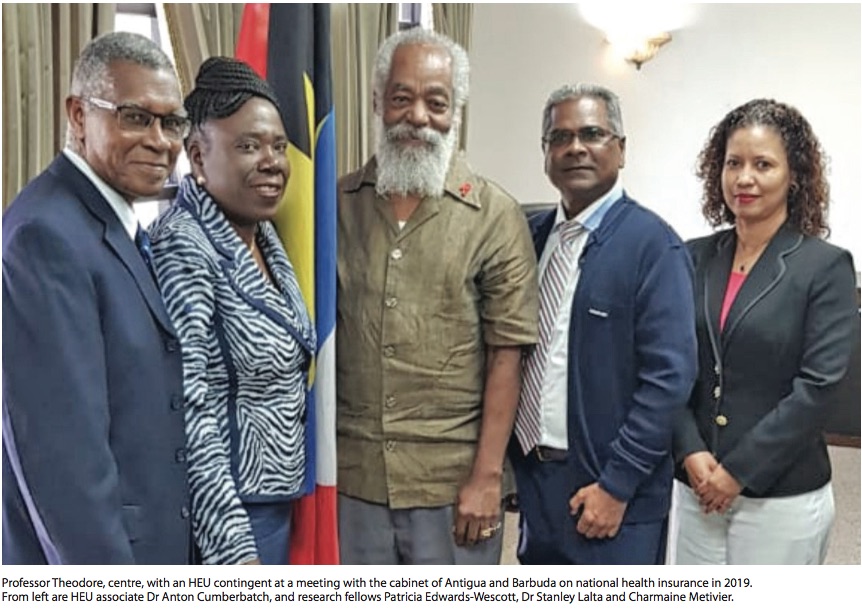
We are living through strange times. As the COVID-19 pandemic changes the world before our very eyes, governments and experts are trying to work out how to deal with a crisis the likes of which we have never seen — and to prepare for what comes after the pandemic containment.
At The UWI, HEU, Centre for Health Economics Professor Emeritus Karl Theodore and a research team have been working with the government of Trinidad and Tobago and agencies across the region to manage the healthcare and socio-economic response to the virus, and to get an idea of what its impact will be on our countries in the long term.
“The way this virus is affecting the economic systems is different to anything we’ve seen. It is not only stopping you from getting the kind of supplies you need to carry on your production, but also stopping your people from coming to work,” says Professor Theodore. “As fast as the epidemic reduces the capacity of the economy to actually spend money, we have to find a way to put money back into the system. If we don’t, the economy will grind to a halt.”
Professor Theodore is the former Director of HEU and was instrumental in its establishment in 1995. He has spearheaded the HEU’s contributions to health sector reform across the region. On April 16, he was appointed to Trinidad and Tobago’s post- COVID-19 “Road Map to Recovery” team established by the Government.
He says there are two economic issues on which we must focus to get through this crisis: “First, we have to try and get money back into the hands of people who don’t have any because of the pandemic. Secondly, we have to acknowledge that, when this is finished, the economy will be in a very bad way. Our deficit and public debt will be very high, and we have to come up with a plan to get the economy back on its feet.”
Essentially, the country’s two priorities are to - make sure people have access to the resources they need to survive right now, and plan for how we will rebuild the economy once this is all over.

The Trinidad and Tobago government has already begun putting measures in place that will allow households access to money and food during the pandemic with such programmes as the salary relief grant. Across the world, many countries are implementing similar tactics. The concept of Universal Basic Income (UBI), where all citizens will have access to a basic sum of money every month regardless of their employment status, has been increasingly talked about as a solution to widespread poverty during this crisis, and versions of this policy have been implemented in places like Spain and the Netherlands. Our salary relief grant programme is in a similar category but, with our financial capacity, it is unlikely we can implement a proposal like this in the Caribbean region.
“We have to keep that in our minds as the sort of standard we have to aim for, but we have to be practical with our resource limitations to put conditions on who gets access,” says Professor Theodore.
“Part of the challenge is not knowing how long the pandemic will last. If it only lasts three months, we probably will get through - with some difficulty - using this type of proposal. But, when you start thinking about six and nine months, then the challenge is very different. I don’t think any Caribbean government has the kind of liquidity to sustain that kind of programme. They would have to come up with different measures. Perhaps, instead of cash, governments will have to get access to resources for themselves and have a number of distribution centres. Eventually, all of our governments are going to run out of cash. So they are going to have to access resources in a very direct way and share these resources among people. We are talking about a government that would probably have to introduce laws that would give them the capacity to access people’s property in a way where they could share those things with everybody.”
Before our governments get to the point of running out of money, there are measures that Professor Theodore suggests to manage the revenue we do have. “All the countries in the region have this problem, where they don’t collect all the money in taxes that they are supposed to. The average percentage of taxes not collected by governments of the region is probably about 30 per cent and [in one or two countries] as much as 40 per cent. A number of people and businesses in these countries have developed strategies of avoiding their tax payments.” He recommends that governments start looking into making sure that those who have these resources are meeting their legal requirement.
On the other hand, our governing bodies have an issue with spending. “The literature tells us that the average level of waste in government spending worldwide is about 20 per cent. I suspect that we are above that number. Corruption may account for 20-30 per cent but spending decision-making is also a problem. The time has come for us to look at the studies that show how our money is spent and change the way we spend. If countries look at how they are collecting money and how they are spending money, that would be a major factor in closing the inevitable deficit once this epidemic has run its course. It will be a bigger deficit than we have ever had so we cannot address it as we have addressed deficits in the past. We must do things differently and that is my main message to all governments. Otherwise, the economy will not recover.”
Naturally, this crisis will exacerbate societal issues with which we are already grappling. One such issue is dealing with the immigrant population, particularly from neighbouring Venezuela.
The HEU’s Advisor says: “Should the Venezuelans have access to the same kind of assistance as our citizens and residents? Now, from a moral point of view, given the condition thatthesocietyisgoingtobein,theanswerisaclearyes.They are human beings who are facing the same kind of problems as the rest of us. But, from a practical point of view, the answer is more complicated. I don’t think the country has the resources now to do that. What I hope we are doing is coming up with a proposal to look after them. We have said they will have to depend on the kindness of our citizens but, as a government, once we have migrants like that in our midst, we have to come up with a humane solution.”
Professor Theodore stresses that, while it will be difficult to manage this venture with our resources already spread thin, it is a moral imperative to find solutions that factor in our immigrant population. They are human beings with rights, just like the rest of us. And if we don’t take this issue seriously, there will be rippling repercussions for us as well.
“If, because of our unwillingness, we didn’t reach out to help, our healthcare system will be even more burdened than before.” The mantra of ‘flattening the curve’ - reducing the rate of spread so that our healthcare systems can manage the influx of patients without being overwhelmed - and dealing with the vulnerable populations among us is not just the ethical decision, it is crucial for our collective welfare.

I’m not downplaying the difficulty in reaching out to them, but we have to give it some thought. My father used to say, no matter how much you have, it could always split in two to be shared with somebody. That is the attitude we have to take. It’s going to be hard, and a lot of people will object. But we must devise a strategy to ensure that those people who are among us are not just left on their own. That doesn’t make any moral or practical sense.”
Even though these issues must be dealt with by our leaders on the macro level, citizens also have to play a role in mitigating this crisis. Findings of Market Facts and Opinions based on Google’s COVID-19 Community Mobility Report dated April 4, 2020 show Trinidad and Tobago tobetheleastcompliantintheregionwhenitcomestostaying home. If we are to make it out of this as soon as possible and with as little damage as possible, we must change that.
“People have to stop meeting and going out. That is the basic message. It’s hard but we must hold some strain. The longer we hold strain in our houses, the more likely we are to get out of this faster. If we don’t do that and we let this pandemic get out of hand, it will do immense damage to our health system, while the damage to the economy will be drastic. This place will become one where nobody will want to live anymore. If we don’t behave in a way to get this pandemic out of our country as soon as possible, it will do the kind of damage that nothing has ever done. We must behave in a way that limits the damage to our health and our economy thatsustainsus.”
The front lines of this battle are no longer in the wards of hospitals. It is in our homes and our hands, and we must make the collective choice to physically distance ourselves, for the sake of our individual and collective futures.